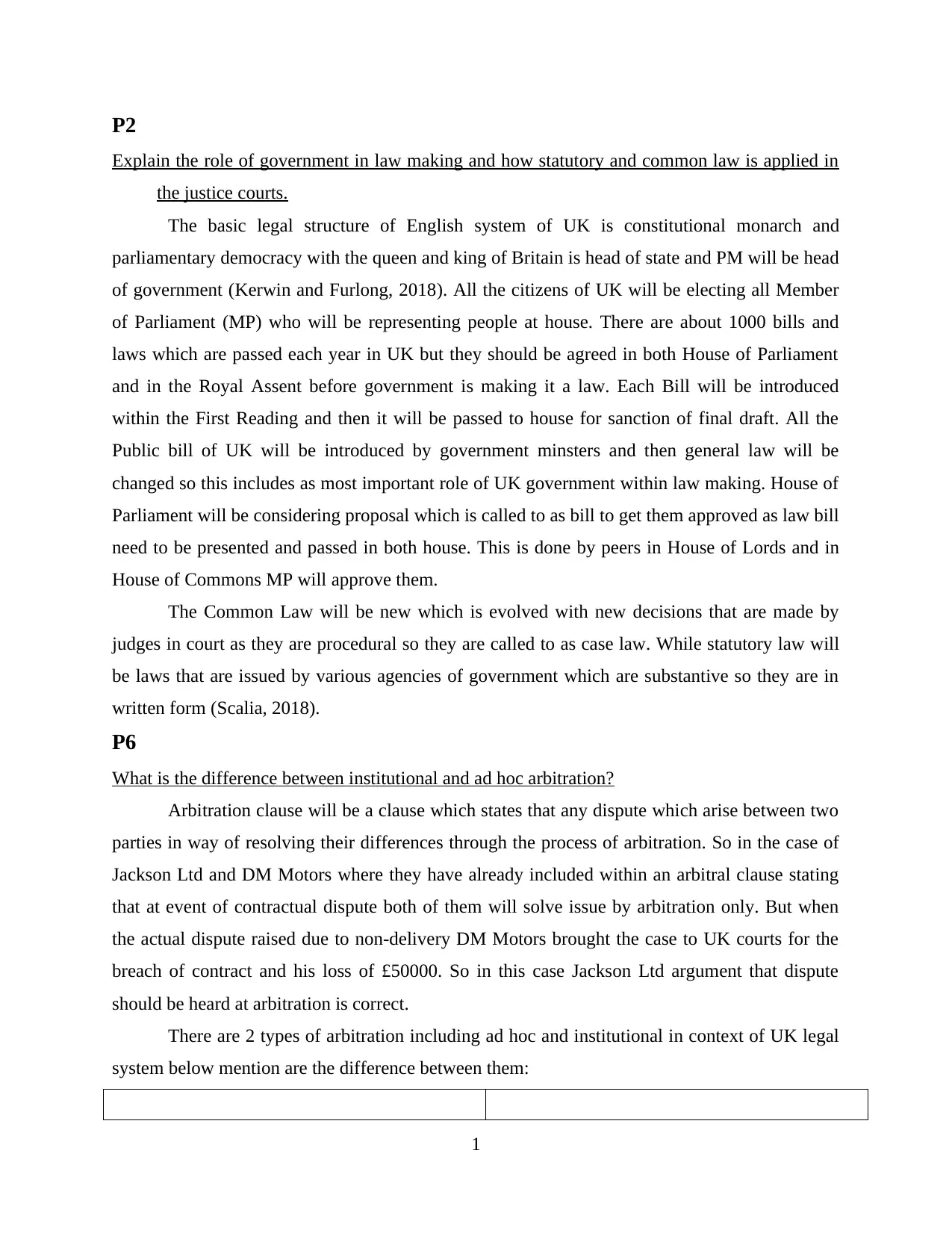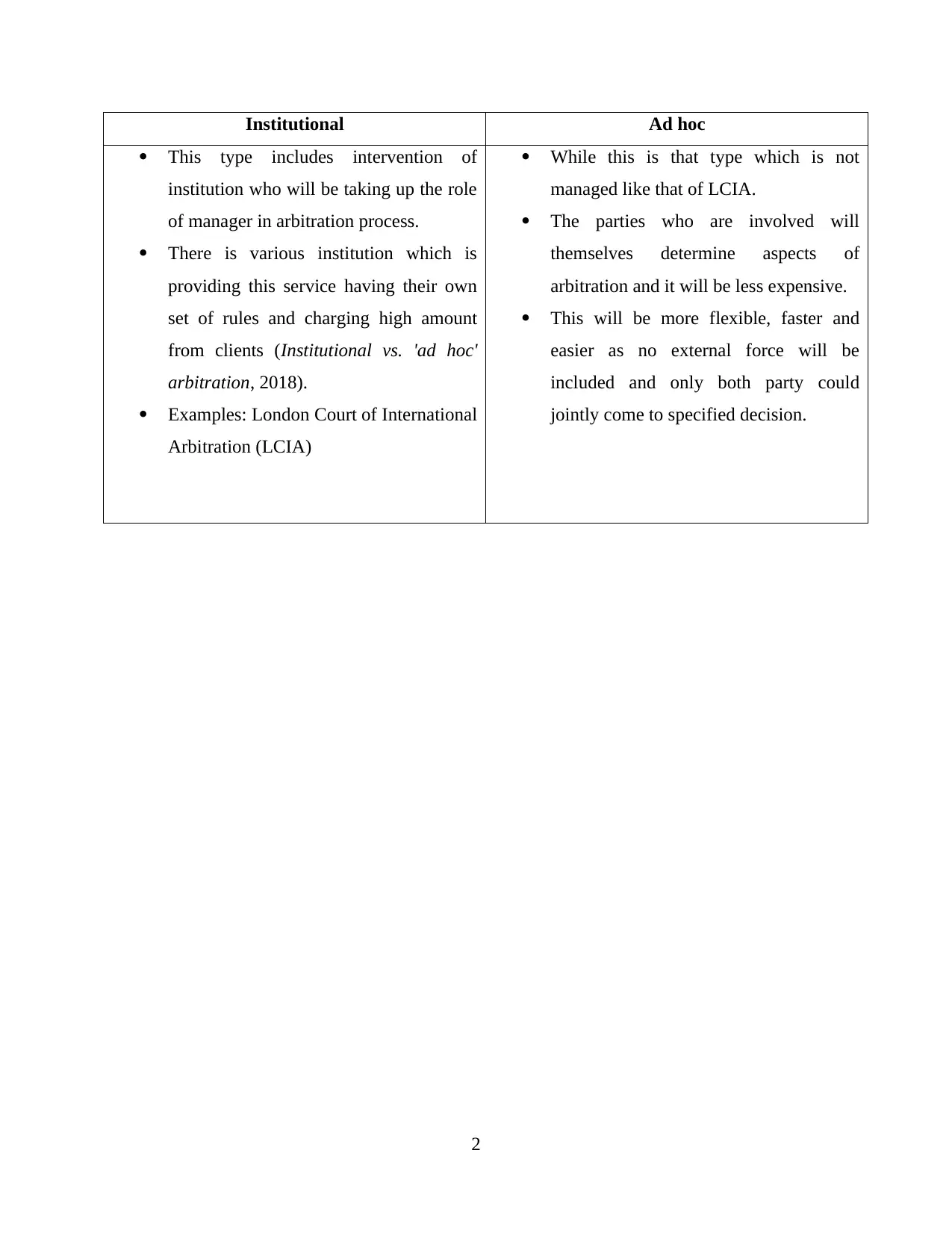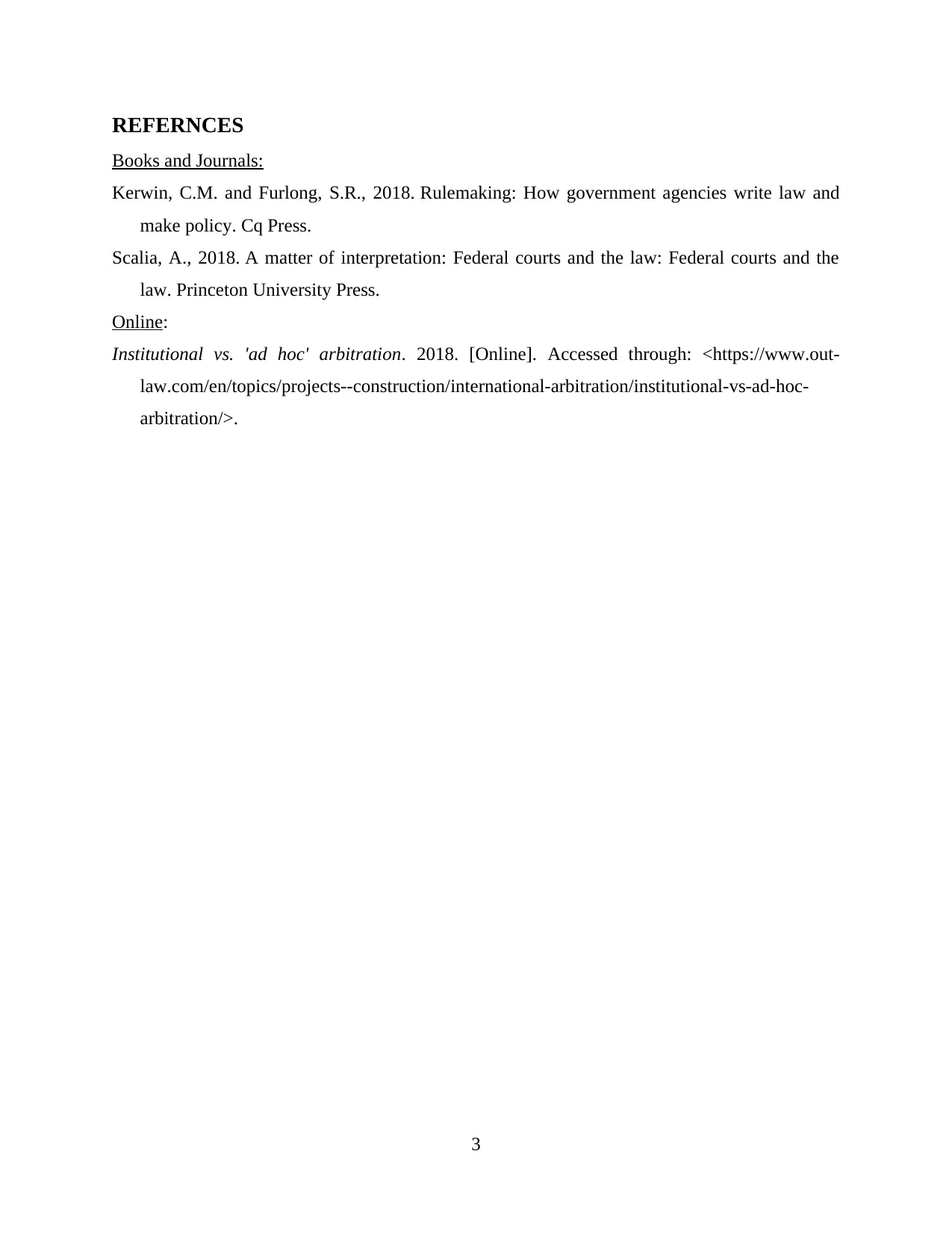Business Law Assignment: Government, Law Making, Arbitration Types
VerifiedAdded on 2021/01/02
|5
|703
|294
Homework Assignment
AI Summary
This business law assignment explores the role of government in law making within the UK legal system, differentiating between statutory and common law. It examines how bills become laws through the parliamentary process and the roles of the House of Commons and House of Lords. The assignment also clarifies the differences between institutional and ad hoc arbitration, highlighting the involvement of institutions in institutional arbitration versus the flexibility and cost-effectiveness of ad hoc arbitration. References to relevant legal texts and online resources support the analysis, providing a comprehensive overview of these key legal concepts.

BUSINESS LAW
Paraphrase This Document
Need a fresh take? Get an instant paraphrase of this document with our AI Paraphraser

TABLE OF CONTENTS
P2.....................................................................................................................................................1
Explain the role of government in law making and how statutory and common law is applied
in the justice courts......................................................................................................................1
P6.....................................................................................................................................................1
What is the difference between institutional and ad hoc arbitration?..........................................1
REFERNCES...................................................................................................................................3
P2.....................................................................................................................................................1
Explain the role of government in law making and how statutory and common law is applied
in the justice courts......................................................................................................................1
P6.....................................................................................................................................................1
What is the difference between institutional and ad hoc arbitration?..........................................1
REFERNCES...................................................................................................................................3

P2
Explain the role of government in law making and how statutory and common law is applied in
the justice courts.
The basic legal structure of English system of UK is constitutional monarch and
parliamentary democracy with the queen and king of Britain is head of state and PM will be head
of government (Kerwin and Furlong, 2018). All the citizens of UK will be electing all Member
of Parliament (MP) who will be representing people at house. There are about 1000 bills and
laws which are passed each year in UK but they should be agreed in both House of Parliament
and in the Royal Assent before government is making it a law. Each Bill will be introduced
within the First Reading and then it will be passed to house for sanction of final draft. All the
Public bill of UK will be introduced by government minsters and then general law will be
changed so this includes as most important role of UK government within law making. House of
Parliament will be considering proposal which is called to as bill to get them approved as law bill
need to be presented and passed in both house. This is done by peers in House of Lords and in
House of Commons MP will approve them.
The Common Law will be new which is evolved with new decisions that are made by
judges in court as they are procedural so they are called to as case law. While statutory law will
be laws that are issued by various agencies of government which are substantive so they are in
written form (Scalia, 2018).
P6
What is the difference between institutional and ad hoc arbitration?
Arbitration clause will be a clause which states that any dispute which arise between two
parties in way of resolving their differences through the process of arbitration. So in the case of
Jackson Ltd and DM Motors where they have already included within an arbitral clause stating
that at event of contractual dispute both of them will solve issue by arbitration only. But when
the actual dispute raised due to non-delivery DM Motors brought the case to UK courts for the
breach of contract and his loss of £50000. So in this case Jackson Ltd argument that dispute
should be heard at arbitration is correct.
There are 2 types of arbitration including ad hoc and institutional in context of UK legal
system below mention are the difference between them:
1
Explain the role of government in law making and how statutory and common law is applied in
the justice courts.
The basic legal structure of English system of UK is constitutional monarch and
parliamentary democracy with the queen and king of Britain is head of state and PM will be head
of government (Kerwin and Furlong, 2018). All the citizens of UK will be electing all Member
of Parliament (MP) who will be representing people at house. There are about 1000 bills and
laws which are passed each year in UK but they should be agreed in both House of Parliament
and in the Royal Assent before government is making it a law. Each Bill will be introduced
within the First Reading and then it will be passed to house for sanction of final draft. All the
Public bill of UK will be introduced by government minsters and then general law will be
changed so this includes as most important role of UK government within law making. House of
Parliament will be considering proposal which is called to as bill to get them approved as law bill
need to be presented and passed in both house. This is done by peers in House of Lords and in
House of Commons MP will approve them.
The Common Law will be new which is evolved with new decisions that are made by
judges in court as they are procedural so they are called to as case law. While statutory law will
be laws that are issued by various agencies of government which are substantive so they are in
written form (Scalia, 2018).
P6
What is the difference between institutional and ad hoc arbitration?
Arbitration clause will be a clause which states that any dispute which arise between two
parties in way of resolving their differences through the process of arbitration. So in the case of
Jackson Ltd and DM Motors where they have already included within an arbitral clause stating
that at event of contractual dispute both of them will solve issue by arbitration only. But when
the actual dispute raised due to non-delivery DM Motors brought the case to UK courts for the
breach of contract and his loss of £50000. So in this case Jackson Ltd argument that dispute
should be heard at arbitration is correct.
There are 2 types of arbitration including ad hoc and institutional in context of UK legal
system below mention are the difference between them:
1
⊘ This is a preview!⊘
Do you want full access?
Subscribe today to unlock all pages.

Trusted by 1+ million students worldwide

Institutional Ad hoc
This type includes intervention of
institution who will be taking up the role
of manager in arbitration process.
There is various institution which is
providing this service having their own
set of rules and charging high amount
from clients (Institutional vs. 'ad hoc'
arbitration, 2018).
Examples: London Court of International
Arbitration (LCIA)
While this is that type which is not
managed like that of LCIA.
The parties who are involved will
themselves determine aspects of
arbitration and it will be less expensive.
This will be more flexible, faster and
easier as no external force will be
included and only both party could
jointly come to specified decision.
2
This type includes intervention of
institution who will be taking up the role
of manager in arbitration process.
There is various institution which is
providing this service having their own
set of rules and charging high amount
from clients (Institutional vs. 'ad hoc'
arbitration, 2018).
Examples: London Court of International
Arbitration (LCIA)
While this is that type which is not
managed like that of LCIA.
The parties who are involved will
themselves determine aspects of
arbitration and it will be less expensive.
This will be more flexible, faster and
easier as no external force will be
included and only both party could
jointly come to specified decision.
2
Paraphrase This Document
Need a fresh take? Get an instant paraphrase of this document with our AI Paraphraser

REFERNCES
Books and Journals:
Kerwin, C.M. and Furlong, S.R., 2018. Rulemaking: How government agencies write law and
make policy. Cq Press.
Scalia, A., 2018. A matter of interpretation: Federal courts and the law: Federal courts and the
law. Princeton University Press.
Online:
Institutional vs. 'ad hoc' arbitration. 2018. [Online]. Accessed through: <https://www.out-
law.com/en/topics/projects--construction/international-arbitration/institutional-vs-ad-hoc-
arbitration/>.
3
Books and Journals:
Kerwin, C.M. and Furlong, S.R., 2018. Rulemaking: How government agencies write law and
make policy. Cq Press.
Scalia, A., 2018. A matter of interpretation: Federal courts and the law: Federal courts and the
law. Princeton University Press.
Online:
Institutional vs. 'ad hoc' arbitration. 2018. [Online]. Accessed through: <https://www.out-
law.com/en/topics/projects--construction/international-arbitration/institutional-vs-ad-hoc-
arbitration/>.
3
1 out of 5
Related Documents
Your All-in-One AI-Powered Toolkit for Academic Success.
+13062052269
info@desklib.com
Available 24*7 on WhatsApp / Email
![[object Object]](/_next/static/media/star-bottom.7253800d.svg)
Unlock your academic potential
Copyright © 2020–2025 A2Z Services. All Rights Reserved. Developed and managed by ZUCOL.




